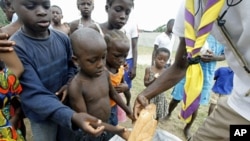After months of fighting, the United Nations refugee agency says it is only now that the desperate conditions under which tens of thousands of homeless people are living is becoming clear. This is because insecurity in western Ivory Coast has prevented U.N. staff from gaining access to many of them.
The UNHCR says fighting appears to have ended in the wake of the capture of the former President, Laurent Gbagbo. Nevertheless, it says ethnic tensions remain high and many people are still hiding in the bush.
UNHCR spokesman, Andrej Mahecic, says in Duekoue, 27,000 people currently are being sheltered at the overcrowded Catholic mission, after fleeing nearby villages. He says five of these people died this week of malaria.
"Many of the displaced told UNHCR they are waiting to see security restored in their areas of origin so that they can return home. Some of them have asked to be escorted back to their villages, for fear of harassment at checkpoints," Mahecic said.
Mahecis added that "there have been reports over the past 10 days of rape and physical abuse by armed men along the road from Duekoue to Bangolo. Other IDPs, traumatized by the recent massacres in Duekoue say they want to leave the town and seek their families in other areas."
In early April, the town of Duekoue was the scene of a massacre, which claimed an estimated 800 lives. Mahecic describes as deplorable the living conditions of thousands of other displaced people scattered throughout the region.
He says the UNHCR is working to increase its presence in western Ivory Coast so it can more effectively provide help to these destitute people.
Meanwhile, the World Food Program (WFP) reports it finally has been able to reach and thoroughly assess the damage done to its warehouse in the commercial capital, Abidjan. A few days ago, the warehouse was looted of food stock and set on fire.
WFP spokeswoman, Emilia Casella, says aid workers were surprised and relieved to find that some of the food stock had survived the onslaught and might be recoverable.
"We had reported that the entire site was looted. My colleague had sent me a note saying that they are still doing an assessment that all of the rice and oil was stolen. And, obviously, the rice is a very important staple," Casella said. "But, there were some quantities of high nutrient corn-soy blend, which is generally used as special food, a supplementary food for malnourished children, which apparently may be recoverable as well as, perhaps, some quantities of peas and salt. So, we are pleased to know that there is some food that we may be able to recover in Abidjan."
Casella says WFP plans to send two flights, carrying 90 tons of rice, into Abidjan on Saturday. She says additional flights also are planned for the following two days.
If all goes as planned, she says some 270 tons of rice will be brought into Abidjan, enough to feed 81,000 people for one week.
Ivory Coast IDPs Living in Alarming Conditions




